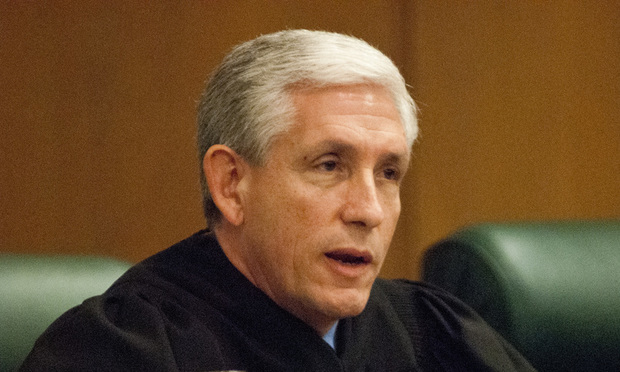Special Education Teachers' Challenge Over Child Abuse Registry Tossed
Presiding Justice David Nahmias included the consolation embedded in other recent sovereign immunity decisions. While state officials can't be sued in their official capacities, they can be sued individually.
September 11, 2018 at 02:34 PM
4 minute read
 Presiding Justice David Nahmias, Supreme Court of Georgia (Photo: John Disney/ALM)
Presiding Justice David Nahmias, Supreme Court of Georgia (Photo: John Disney/ALM)
Five Albany teachers and school administrators who worked in a special education program and were put on the state Child Abuse Registry because some of their students allegedly groped other students have lost their suit because of sovereign immunity of the state and procedural details with a ruling Monday from the Georgia Supreme Court.
“This case involves a variety of constitutional challenges to Georgia's Child Abuse Registry that a group of high school teachers and administrators filed directly in superior court after their names were put on the Registry. We cannot properly reach the merits of those challenges, however—and neither could the trial court—because some of the claims are barred by sovereign immunity and the remaining ones should have been raised in the then-pending administrative proceeding also initiated by the teachers and administrators,” Presiding Justice David Nahmias wrote for a unanimous court.
“Accordingly, we reverse the part of the trial court's order concluding that the court could decide the merits of the challenges, vacate the part of the order declaring the Registry statutes and rules to be unconstitutional and granting injunctive relief, and remand with direction to dismiss the case,” Nahmias said.
“Because every component of the plaintiffs' case should have been dismissed by the superior court on at least one of the grounds discussed above, we reverse that court's judgment to the contrary and vacate the judgment to the extent it addressed the merits, granted the plaintiffs injunctive relief, and declared the Registry statutes and rules to be unconstitutional,” Nahmias said. “The trial court should not have addressed the constitutionality of the Registry statutes and rules, and we express no opinion on those questions in this case.”
Nahmias included the consolation embedded in other recent sovereign immunity decisions. While state officials can't be sued in their official capacities, they can be sued individually.
The lawsuit was filed by five Dougherty County teachers and school administrators who worked in the special education program at Albany High School. Following two incidents in which several students allegedly groped other students, a child abuse investigator for the Dougherty County Division of Family and Children Services “substantiated” reports of child abuse on the basis that the five teachers and school administrators were inadequately supervising the students in the classroom and lunchroom, according to the opinion. All five were placed on the Child Abuse Registry.
“Having reviewed the record, we can understand why the plaintiffs were so upset about the way in which their names came to be put on the Child Abuse Registry and why they wanted to seek prompt relief in the superior court,” Nahmias said. “But having initiated the administrative process available to challenge their listings—the process they were required to use to assert any as-applied constitutional challenges—it is clear under this court's precedents that they could not jump off that path and head straight to court, even with facial constitutional challenges, nor could they sue the State or its officials as officials.”
The state was represented by the Office of Attorney General Chris Carr, including Solicitor General Sarah Warren, newly appointed to the Supreme Court. Carr's spokeswoman said he had no comment on the decision.
The teachers and administrators were represented by Gilbert Murrah of Bainbridge and Charles Ferenchick of Cairo. They could not be reached immediately.
Nahmias said the case is remanded “with direction to the superior court to dismiss it.”
This content has been archived. It is available through our partners, LexisNexis® and Bloomberg Law.
To view this content, please continue to their sites.
Not a Lexis Subscriber?
Subscribe Now
Not a Bloomberg Law Subscriber?
Subscribe Now
NOT FOR REPRINT
© 2025 ALM Global, LLC, All Rights Reserved. Request academic re-use from www.copyright.com. All other uses, submit a request to [email protected]. For more information visit Asset & Logo Licensing.
You Might Like
View All
From 'Confusing Labyrinth' to Speeding 'Roller Coaster': Uncertainty Reigns in Title IX as Litigators Await Second Trump Admin
6 minute read
University of Georgia School of Law Finds Next Dean on Its Own Faculty
3 minute read
Teen Charged in Barrow School Shooting and His Father to Stay in Custody After Hearings
5 minute readTrending Stories
- 1Bar Report - Jan. 20
- 2Saxton & Stump Lands Newly Retired Ex-Chief Judge From Middle District of Pa.
- 3Judicial Admissions and Medical Malpractice Defense
- 4South Florida Attorney Charged With Aggravated Battery After Incident in Prime Rib Line
- 5'A Death Sentence for TikTok'?: Litigators and Experts Weigh Impact of Potential Ban on Creators and Data Privacy
Who Got The Work
J. Brugh Lower of Gibbons has entered an appearance for industrial equipment supplier Devco Corporation in a pending trademark infringement lawsuit. The suit, accusing the defendant of selling knock-off Graco products, was filed Dec. 18 in New Jersey District Court by Rivkin Radler on behalf of Graco Inc. and Graco Minnesota. The case, assigned to U.S. District Judge Zahid N. Quraishi, is 3:24-cv-11294, Graco Inc. et al v. Devco Corporation.
Who Got The Work
Rebecca Maller-Stein and Kent A. Yalowitz of Arnold & Porter Kaye Scholer have entered their appearances for Hanaco Venture Capital and its executives, Lior Prosor and David Frankel, in a pending securities lawsuit. The action, filed on Dec. 24 in New York Southern District Court by Zell, Aron & Co. on behalf of Goldeneye Advisors, accuses the defendants of negligently and fraudulently managing the plaintiff's $1 million investment. The case, assigned to U.S. District Judge Vernon S. Broderick, is 1:24-cv-09918, Goldeneye Advisors, LLC v. Hanaco Venture Capital, Ltd. et al.
Who Got The Work
Attorneys from A&O Shearman has stepped in as defense counsel for Toronto-Dominion Bank and other defendants in a pending securities class action. The suit, filed Dec. 11 in New York Southern District Court by Bleichmar Fonti & Auld, accuses the defendants of concealing the bank's 'pervasive' deficiencies in regards to its compliance with the Bank Secrecy Act and the quality of its anti-money laundering controls. The case, assigned to U.S. District Judge Arun Subramanian, is 1:24-cv-09445, Gonzalez v. The Toronto-Dominion Bank et al.
Who Got The Work
Crown Castle International, a Pennsylvania company providing shared communications infrastructure, has turned to Luke D. Wolf of Gordon Rees Scully Mansukhani to fend off a pending breach-of-contract lawsuit. The court action, filed Nov. 25 in Michigan Eastern District Court by Hooper Hathaway PC on behalf of The Town Residences LLC, accuses Crown Castle of failing to transfer approximately $30,000 in utility payments from T-Mobile in breach of a roof-top lease and assignment agreement. The case, assigned to U.S. District Judge Susan K. Declercq, is 2:24-cv-13131, The Town Residences LLC v. T-Mobile US, Inc. et al.
Who Got The Work
Wilfred P. Coronato and Daniel M. Schwartz of McCarter & English have stepped in as defense counsel to Electrolux Home Products Inc. in a pending product liability lawsuit. The court action, filed Nov. 26 in New York Eastern District Court by Poulos Lopiccolo PC and Nagel Rice LLP on behalf of David Stern, alleges that the defendant's refrigerators’ drawers and shelving repeatedly break and fall apart within months after purchase. The case, assigned to U.S. District Judge Joan M. Azrack, is 2:24-cv-08204, Stern v. Electrolux Home Products, Inc.
Featured Firms
Law Offices of Gary Martin Hays & Associates, P.C.
(470) 294-1674
Law Offices of Mark E. Salomone
(857) 444-6468
Smith & Hassler
(713) 739-1250







